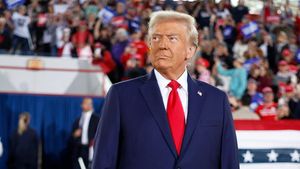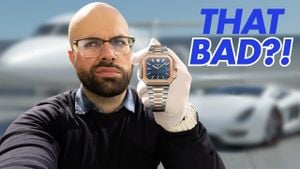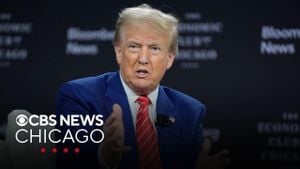Vice President Kamala Harris made headlines recently for her surprise appearance on Saturday Night Live (SNL) just days before the presidential election on November 2, 2024. This moment was not just entertaining; it also had significant repercussions related to FCC regulations.
The SNL episode, hosted by comedian John Mulaney, featured Harris popping up to encourage Maya Rudolph, who plays her on the show. Harris and Rudolph dressed almost identically, which made their poignant exchange even more memorable. The entire episode offered both comedic brilliance and sharp political commentary, as it included parodies of current events and political personalities, with cameos from other notable figures, like Jim Gaffigan as Minnesota Governor Tim Walz.
CNN reported on the media push surrounding Harris' appearance, as her team sought to engage with younger voters by using various platforms to reach out. This push emphasized the importance of social media and late-night comedy shows as viable campaign tools. During the show, Harris took on the role of her own cheerleader, humorously advising Rudolph to embrace her identity as the vice president.
Following Harris' impactful yet brief 90-second appearance, critics quickly pointed out potential violations of the FCC’s equal-time rule. This regulation mandates equal airtime for political candidates across the media, aiming to maintain fairness during election cycles. Concerns erupted when FCC Commissioner Brendan Carr, appointed by former President Trump, claimed Harris’ SNL cameo violated this rule and reflected biased practices by NBC.
On the flip side, Harris’ participation marked yet another notch on SNL’s belt for highlighting political figures. Historically, the show has seen guest appearances from various politicians, including former presidents like Trump and Obama. This reputation for mixing politics with humor helped to amplify interest and discussion around her portrayal and the ramifications of her appearance.
Adding fuel to the fire, Dr. Trump himself commented on Harris’ appearance, stating during his own rally, "She uses everything I do. They copied my routine." His claim centered around the mirroring aspect present during both his and Harris’ comedic sketches, which drew inevitable comparisons.
Following the blowback from Harris' appearance, NBC took action to adhere to the equal-time rule. The network notified the FCC of Trump's request for comparable airtime. This means if Trump chooses to take full advantage of this situation, he could be granted the same amount of time to broadcast his ideas or campaign messages, as required by law.
Commissioner Carr, as reported, argued against Harris' representation on SNL, asserting it posed as a blatant attempt to evade the regulations intended to maintain electoral balance. "The purpose of the rule is to avoid exactly this type of biased and partisan conduct - a licensed broadcaster using the public airwaves to exert its influence for one candidate on the eve of an election," he stated compellingly.
It remains uncertain if Trump plans to utilize his allotted airtime, but the situation highlights the peculiar intersection of politics and entertainment. Public sentiment is increasingly swayed by such appearances, blurring the lines between serious political discourse and late-night sketches.
There's also the historical precedent for the equal-time rule. When Trump appeared on SNL during the 2016 election season, several of his rivals capitalized on the same opportunity, which raises the question if any opposition candidates will also seek airtime following Harris' debut.
Overall, this intertwining of late-night television with serious political affairs put not just Harris but the network under intense scrutiny, and the repercussions of such daring campaign strategies continue to be dissected. Harris' moment might have broken records on viewership, creating laughter and cheer; nonetheless, it underscored the delicate dance between show business and politics, and the laws governing our communication networks certainly haven’t been ignored.
Will political figures continue to leverage comedy shows as platforms to reach voters? How the FCC navigates these regulations as we head toward future elections can shape the way candidates approach their campaigns, potentially revolutionizing methods of reaching the electorate.



